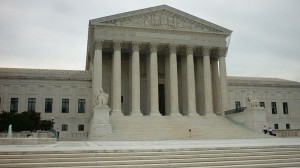 Washington, D.C. — Reports indicate that the United States Supreme Court has received over two dozen briefs from legal organizations nationwide expressing their support for Biblical marriage.
Washington, D.C. — Reports indicate that the United States Supreme Court has received over two dozen briefs from legal organizations nationwide expressing their support for Biblical marriage.
As the court is gearing up to hear oral argument next month in the monumental cases regarding California’s Proposition 8 and the Defense of Marriage Act (DOMA), attorneys nationwide have been busy working on friend of the court briefs — also known as amicus briefs, to ensure their voice is heard among America’s highest justices. According to Alliance Defending Freedom (ADF), over 30 supporting briefs have been submitted to the court for both Hollingsworth v. Perry and Windsor v. US.. ADF is a part of the legal team for ProtectMarriage.com, the organization behind Proposition 8.
“Marriage between a man and a woman is a universal good that diverse cultures and faiths have honored throughout the history of Western Civilization,” stated Senior Counsel Austin R. Nimocks in a recent news release. “Marriage isn’t merely a matter of personal preferences. How we treat marriage has societal consequences. The wisest course, as these briefs demonstrate, is for the court to resist demands to prematurely end the national debate over the future of marriage.”
ADF explains that attorney generals from 19 states have filed joint briefs with the Supreme Court in favor of marriage remaining between a man and woman, and at least four legal organizations discussed the religious liberty concerns that the legalization of homosexual “marriage” would raise.
Additionally, three African American groups explained to the court their belief that homosexuality cannot be compared to matters of race or interracial marriage. Approximately 37 legal scholars contended that the states should have the right to preserve marriage and not be forced to do otherwise, and 17 judges and scholars spoke of how international law does not support redefining marriage. Self-identified homosexual and bisexual individuals even expressed their support for leaving marriage the way it has been from the beginning of creation.
As previously reported, after a week of waiting on a decision from the court, the nine justices on the bench accepted California’s Proposition 8 case last December, as well as a challenge to the federal Defense of Marriage Act. The main questions before the court are whether states must permit homosexuals to “marry,” and when they do so, whether the federal government can disagree and choose to limit its recognition of marriage to solely the joining together of a husband and wife.
The matter surrounding Proposition 8 hails back to 2008 when voters in California were presented with a ballot initiative asking if residents wished to enshrine marriage in the state as being between a man and woman. The measure, which sought to add an amendment to the state Constitution to protect the Biblical definition of marriage from infringement, passed by five percentage points.
In 2010, District Court Judge Vaughn Walker overturned Proposition 8 in the case of Perry v. Schwarzenegger, opining that the law violated the Due Process and Equal Protection clauses of the United States Constitution. Walker placed a stay on the law, which the Ninth Circuit later upheld. In February of last year, in a 2 to 1 decision, the Ninth Circuit then agreed with Walker after hearing the case in full, resulting in a timely appeal to the nation’s highest court.
The Defense of Marriage Act, the second matter to be decided by the court, was signed into law by then President Bill Clinton in September 1996 after clearing the House and Senate with overwhelming support. In addition to providing a federal definition of marriage, the law bars homosexual relationships from being recognized by the IRS or the Social Security Administration, and also excludes homosexuals that serve as government workers from being recognized as a couple in order to obtain insurance benefits.
The court is scheduled to hear oral argument regarding the cases on March 26.
Become a Christian News Network Supporter...


